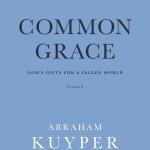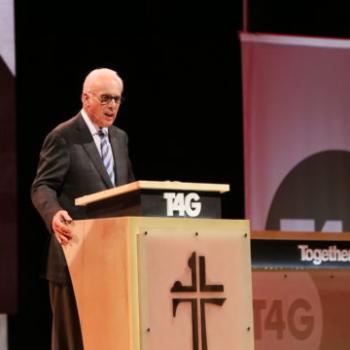How should we pray in public? This is not an inherent skill that you and I are born with. It takes thought and effort and practice. Yes, the Holy Spirit will help us, but we should expect the regular help of the Spirit working through the regular means of grace. That is, as we grow and mature through the course of our lives we will get better or worse in proportion to the time and effort we dedicate to this particular discipline. To that end, Samuel Miller’s classic work Thoughts on Public Prayer has some advice.
These are the things he encourages us to avoid:
- Avoid “the over frequent recurrence of favorite words, and set forms of expression, however unexceptionable in themselves. Among these are the constant repetition in every sentence or two, of the names and titles of God; the perpetual recurrence of the modes of expression, “O god! Great God! Our heavenly Father! Holy Father! We Pray Thee! We beseech thee! etc, or the excessive use of the interjection Oh! prefixed to almost every sentence.” In our time I suppose we’d say “just” is the word to avoid here…
- “Hesitation and apparent embarrassment in utterance is another fault… and a real blemish in the leader in public devotion. As all prayer is to be regarded as the utterance of the heart, so the suppliant ought to be supposed to be at no loss, to have no hesitation about the blessing which he solicits… All stammering, then, all pauses… everything adapted to impair… the confidence of fellow-worshippers in the ability of him who leads… ought to be deemed real faults and to be as much as possible avoided.
- “All ungrammatical expressions in prayer–all expressions foreign from English idiom, and bordering on the style of cant and whining, low and colloquial phrases, ought of course, to be regarded as blemishes and to be carefully avoided.”
- Avoid the lack of “regularity and order.”
“All public prayer… is made up for various departments; such as adoration, confession, thanksgiving, petition, and intercession. A public prayer which should be entirely destitute of any one of these departments would be deemed essentially defective.” - Avoid “descending into too much minuteness of detail.” Public prayer has many parts, and focusing too much on any one either leaves others out or makes the prayer too long.
- Avoid “excessive length.” And here, we see how the church has fallen, because in Miller’s view “an ordinary prayer before [a] sermon ought not to exceed twelves, or at most fifteen minutes in length.”
- Avoid overly figurative or fancy language. “All studied refinement of language; all artificial structure of sentences; all affectation of the beauties of rhetoric, are out of place in the exercise of right prayer. Both evangelical solemnity and good taste equally forbid them.”
- Avoid politics and personalities. “In the house of God persons of all political opinions may meet, harmoniously and affectionately meet, provided they all agree in acknowledging the same Savior, and glorying in the same hope of Divine mercy. They may differ endlessly in their political creeds and wishes, and on a thousand other subjects, and yet assemble in the same temple, and gather round the same altar with fraternal affection, provided they are of one heart, and of one way in regard to the great system of salvation through the redemption that is in Christ.”
Likewise personalities should not be subject to prayer–we should pray, for example, those who need it, but not just because someone is a big name in the community. - Avoid ‘Jesus is my boyfriend’-style language. “All such language, though flowing from earnestness, and dictated by the best of motives, is unhappy, and produces on the minds of the judicious painful impressions.”
- Avoid “indulging in wit, humour, or sarcasm in public prayer.”
- Avoid “formal exhibitions of Christian doctrine.” Doctrine ought to shape and form Scripture, but devotionally rather than explicitly. Prayer “ought never to wear the aspect of a theological lecture addressed to Him who sits on a throne of grace.”
- Avoid using prayer as a bludgeon to attack your theological enemies. Yes, Scripture preaches predestination and eternal damnation, for example, but don’t use prayer to attack those who disagree. “To be fond of introducing them in prayer argues a mind not cast in the apostolic mould, and inordinately set on partial views of truth.”
- Avoid being too familiar in our language with God. Speaking to Him like he’s our buddy “is not in accordance with that deep humility, that profound reverence, and solemn awe with which suppliants, conscious of unworthiness, ought ever to approach the infinite majesty of heaven and earth.”
- That said, avoid being super-humble in prayer too. Certainly humility is important, but there comes a point where our language becomes either unhelpful or untrue. Miller’s advice is to pray about ourselves the way we would want to hear someone else pray about us: as in need of assistance and guidance and help, but not incompetent or buffoonish.
- Avoid flattery of others by means of prayer.
- Avoid words inappropriate to the occasion. I.e. if we’re praying on Thanksgiving, be thankful rather than dour. If we’re praying on a day of fasting, be humble rather than joyous. Etc.
- Avoid irreverence in closing a prayer, in words, tone, and speed.
- Avoid praying at an inappropriate pace, whether too fast or two slow for the circumstances.
More on public prayer next time…
Dr. Coyle Neal is co-host of the City of Man Podcast an Amazon Associate (which is linked in this blog), and an Associate Professor of Political Science at Southwest Baptist University in Bolivar, MO












